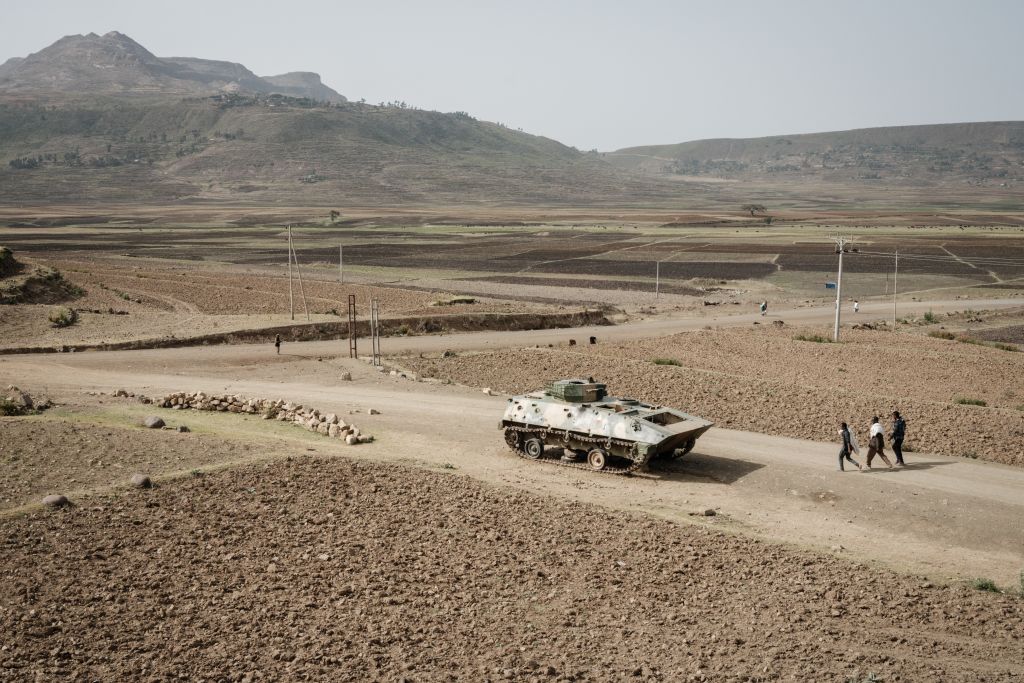Old adversaries Ethiopia and Eritrea appear to be marching toward war, as saber-rattling has escalated into threats, and troops are massing at the shared border.
Shifting alliances, geopolitical aspirations, ethnic divisions and contested access to the Red Sea have become a pressure cooker in the Horn of Africa. Some experts are warning of a growing sense that violent conflict, if not regional warfare, is imminent.
“The Ethiopian government never indicated it would move to secure sea access through force, but Eritrea is gearing up its military for war. Reports indicate it has fortified its border with Ethiopia,” political analyst Constantinos Berhutesfa told Ethiopian news website The Reporter. “The ongoing rhetoric indicates we are going to war. People are worried.”
Eritrean President Isaias Afwerki, in an interview with Eritrean state media on July 19, accused Ethiopia of preparing for war. He described Ethiopian Prime Minister Abiy Ahmed’s ambition to secure access to a Red Sea port as “the plan of a crazy person.”
“This is truly childish provocation. Our message is: No! You had better stay put,” Isaias said. “How can anyone accuse Eritrea while procuring weapons and resorting to daily saber-rattling? [Eritrea] does not aspire to wage war, but if war is forced upon it, it knows how to defend itself.”
Abel Abate Demissie, an Ethiopia-based political analyst for Chatham House, said the Eritrean leader’s rhetoric had an ominous tone.
“Isaias’s speech signals the official end of the relationship between Ethiopia and Eritrea, after months of rumors about deteriorating ties,” he told The Africa Report. “This is the first time he has given a detailed interview about the shift in stance towards Addis Ababa. I think the relationship is beyond repair.”
Eritrea implemented a nationwide military mobilization in February. Ethiopia deployed troops toward the Eritrean border in March.
Increasing friction in Eritrea’s decades-old rivalry with Ethiopia is intertwined with a volatile split among groups in the Tigray region. After Tigrayans and Eritreans fought against each other for two years in the Tigray conflict, some members of the Tigray People’s Liberation Front (TPLF) and officials in Asmara reportedly have forged a new alliance against Ethiopia’s federal government.
Getachew Reda, leader of the pro-Ethiopian government faction in Tigray, said in a July 21 social media post that the TPLF is attempting to seize power by force.
“The foreseeable and forewarned outcome of this unholy alliance between the Eritrean regime and the reactionary faction within the TPLF … is the renewed declaration of war on our people,” he wrote. “This destructive path must be rejected by every Tigrayan.”
During a military ceremony in Jimma on July 21, Ethiopian National Defense Force chief Berhanu Jula warned that a fractured Tigray was on a path to war. He accused the TPLF of refusing to take part in the disarmament, demobilization, and rehabilitation process required by the 2022 Pretoria Agreement that ended the Tigray conflict.
He also said that the group has taken steps to “unearth the weapons it had buried” after the peace deal, adding that no other regional administration possessed that kind of heavy weaponry.
Multiple Ethiopian media outlets have reported that armed forces aligned with the TPLF are motivated to retake disputed territories along Tigray’s border with the Amhara region such as Wolkait and Raya Alamata, which Amhara forces allied with the federal government annexed during the Tigray conflict.
Tigrayan militants have entered areas bordering Amhara, news website Borkena reported on July 23. Three days later, it reported that federal forces were moving heavy weaponry to the eastern parts of the country near the Eritrean border.
Institute for the Study of War analyst Liam Karr said rising tensions could spark conflict in Tigray, but “a large-scale war is unlikely.”
“The various factions are likely unable to afford the political cost of a new war. The region is still scarred from the Tigray war and dealing with the continued humanitarian fallout,” he wrote in the July 24 edition of the institute’s Africa File.
“A low-intensity proxy conflict would mitigate Eritrean, Ethiopia, and Tigrayan concerns with a wider war while enabling all sides to fight for leverage. … But miscalculation or external meddling could fuel a wider conflict.”
Likening the situation to Sudan’s ongoing civil war, which has embroiled regional and Arab Gulf state actors, Constantinos also is urging caution.
“Starting this conflict needs a lot of thought, because ending it would be impossible,” he said. “A single mistake can escalate this tension to war.”

